Changing priorities
A number of different groups have been given priority access in Covid vaccination efforts. Last week, Vancouver added a new cohort to that list: sex workers. At a clinic on the city’s Downtown Eastside, a pop-up vaccination site at a clinic serving sex workers held a successful vaccination drive.
According to co-executive director Lyra McKee, the local health authorities’ approval of the pop-up site was an acknowledgment that sex work is a legitimate profession — and that its practitioners could be missed by standard vaccination campaigns. She added that the authority “is accommodating to a variety of community groups, recognizing that if they just hold clinics themselves there will be communities they can’t reach.”
Weighed down by negative news?
Our smart, bright, weekly newsletter is the uplift you’ve been looking for.The campaign was a success — in one day, 99 vaccinations were administered at the site. Such pop-up models have been used to vaccinate members of other hard-to-reach groups — in London, for instance, pop-up sites at mosques have helped vaccinate the city’s Muslim community, in part by reassuring congregants that the vaccines are halal.
What’s mine is yours
It’s a topsy-turvy world we’re living in: America’s largest coal miners union just announced its support for renewable energy.
The union released a document last week acknowledging that “change is coming, whether we seek it or not,” and confirming that its members will “accept a transition away from fossil fuels in exchange for new jobs in renewable energy.” While not exactly a full-throated endorsement of wind and solar, the announcement is being hailed as a landmark concession, and could change the politics of coal country, whose lawmakers may fear that supporting renewable energy could lead to political blowback.

One of those lawmakers is Joe Manchin of coal-rich West Virginia, perhaps the most critical swing vote in the U.S. Senate. Manchin backed the union’s support for a green energy transition on one condition — that coal miners aren’t left in the dust by it. “Basically what is needed… is the human infrastructure,” Manchin said. “You can’t leave anybody behind.”
Read more at the Associated Press
Pleased to meet you
Like many cities, Abilene, Texas takes an annual count of its population of people experiencing homelessness — but the last few counts have been a little different. Rather than simply tally up the total, the city has taken the time to learn the name of every unhoused person in the city, plus a little bit about their needs.
This has allowed authorities to customize their outreach approach to each person, with the ultimate goal of getting them all into permanent housing. For instance, one person they spoke to didn’t want to go into permanent housing until others he knew had been prioritized first — the outreach workers convinced him that by getting housed himself, he would actually be helping those people. The city’s chronically unhoused population is quite small — only a few dozen people — which made the individualized approach possible, providing a roadmap for other small cities.
After several years of these efforts, Abilene announced that as of the end of 2020 it had reduced chronic homelessness to “functional zero.” “In Abilene we’ve learned that we are either succeeding publicly or failing publicly,” said one of the advocates involved.










